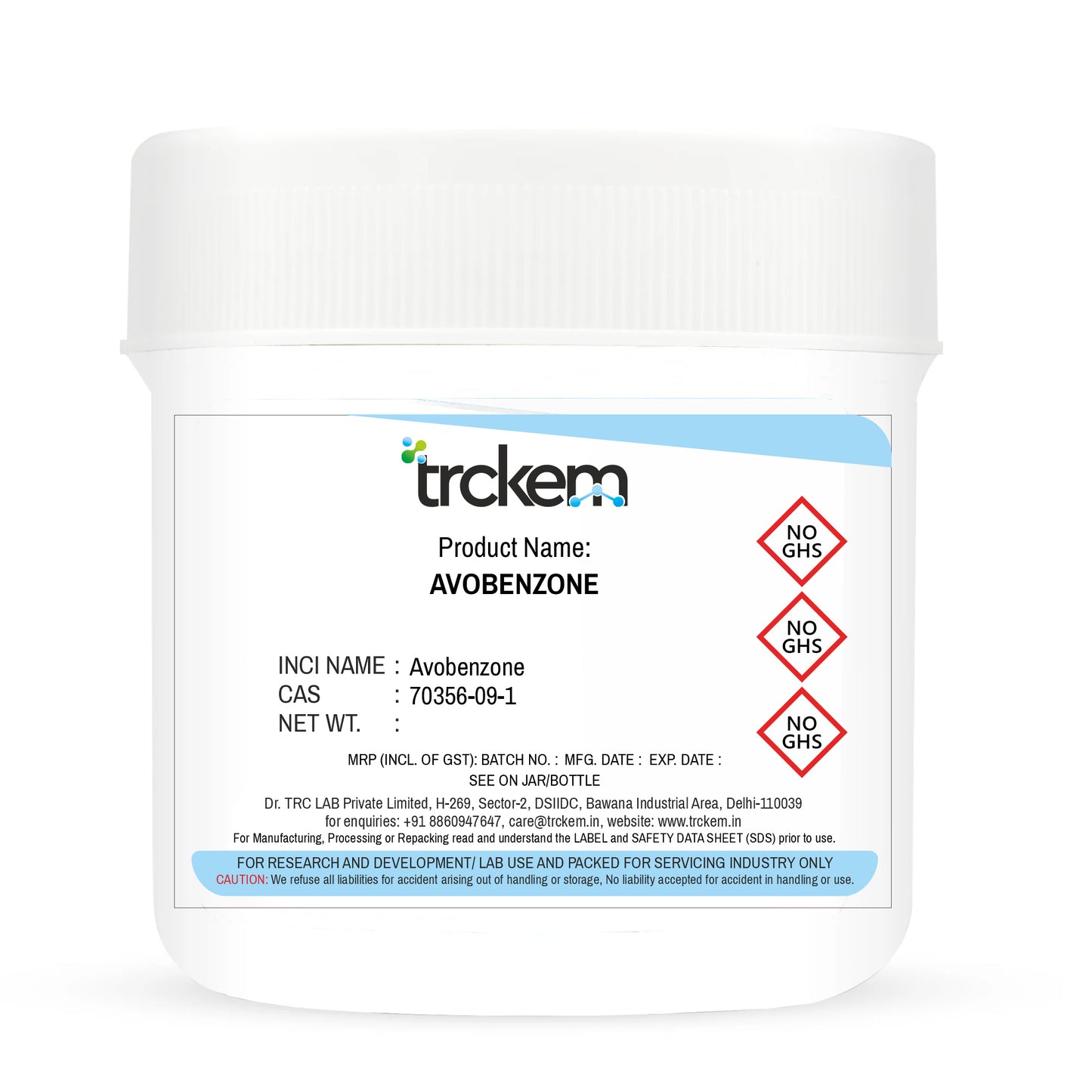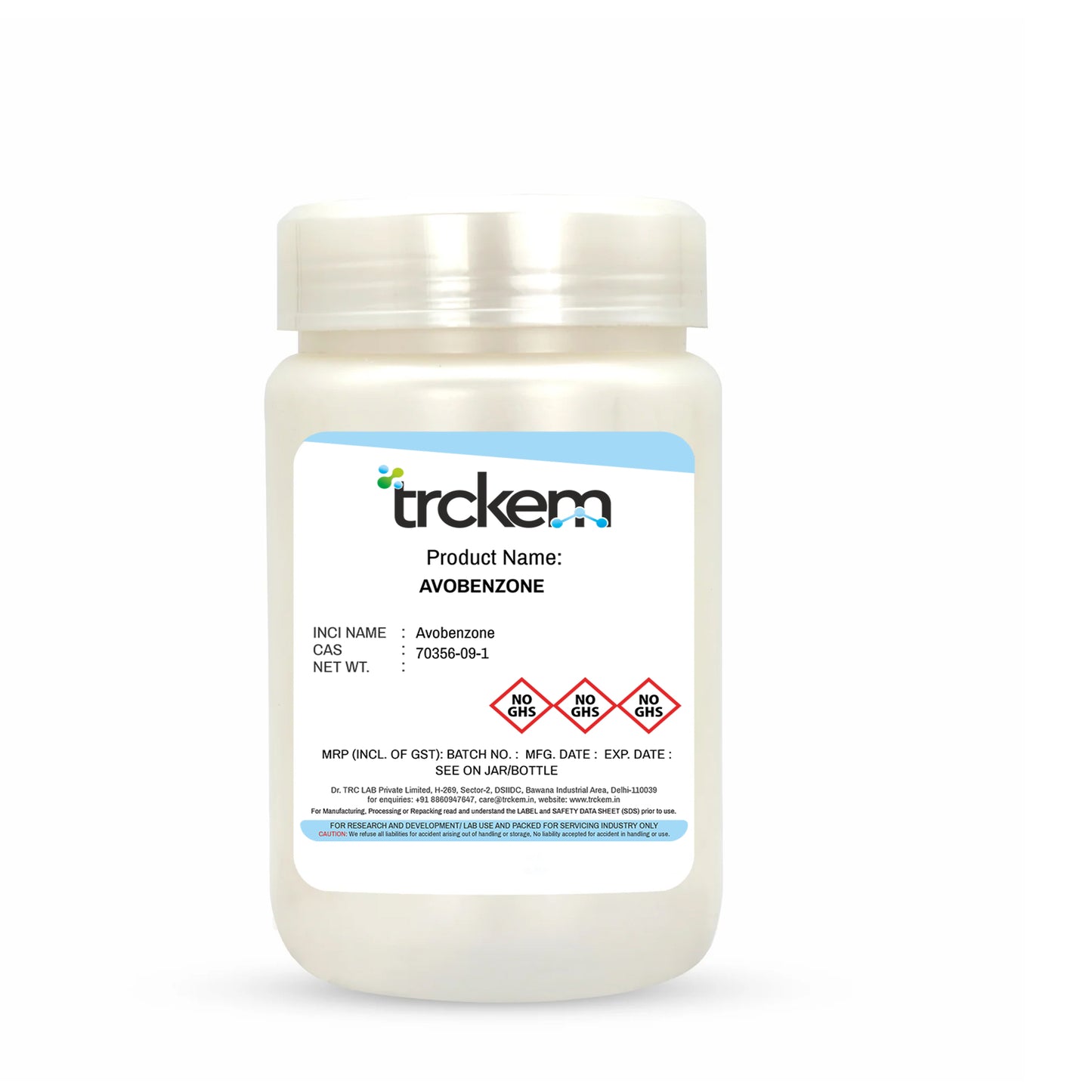

General Description
Avobenzone (Butyl Methoxydibenzoylmethane) is a broad-spectrum chemical sunscreen agent widely used in cosmetic and personal care formulations. It is a light yellow, oil-soluble compound that effectively absorbs UVA rays (320–400 nm), which are primarily responsible for premature skin aging, wrinkles, and long-term sun damage. Known for its superior UVA protection, Avobenzone is a key ingredient in modern sun care formulations designed to prevent photoaging and oxidative stress. It is often combined with other UV filters to achieve balanced, long-lasting photoprotection.
Uses in the Cosmetics Industry
Avobenzone is one of the most commonly used UV filters in global sun care and daily protection products. Its applications include:
- Sunscreens & Sunblocks: Provides high-efficiency UVA absorption, helping prevent sunburn and long-term UV damage.
- Day Creams & Moisturizers with SPF: Protects against daily UVA exposure while maintaining a lightweight texture.
- Makeup with SPF: Used in foundations, BB creams, and primers to provide invisible UV protection.
- Anti-Aging Products: Prevents photo-induced wrinkles, pigmentation, and collagen degradation.
- Lip Care & Body Lotions: Offers additional UVA protection for exposed areas.
Cosmetic manufacturers often buy Avobenzone in bulk for formulation of sunscreens and skincare lines designed for broad-spectrum UV protection. It is typically used in combination with stabilizers such as Octocrylene or Oxybenzone to enhance its photostability.
Hazards
While Avobenzone is approved and considered safe for cosmetic use within regulatory limits, formulators and users should note the following:
- Photoinstability: Avobenzone can degrade when exposed to sunlight, reducing its effectiveness; it should always be formulated with photostabilizers (e.g., Octocrylene, Tinosorb S).
- Skin Sensitivity: Generally well-tolerated, but may cause mild irritation or allergic reactions in sensitive individuals.
- Eye Irritation: Direct contact with eyes may cause mild discomfort; avoid use near the eye area in high concentrations.
- Environmental Impact: Some studies suggest potential ecological effects in aquatic environments; eco-friendly alternatives or encapsulated forms are sometimes preferred for sustainable formulations.
Storage & Stability
- Storage: Store in a cool, dry place away from direct sunlight and oxidizing agents.
- Stability: Stable in well-formulated systems when combined with stabilizing agents. Should be kept in airtight containers to prevent degradation.
Avobenzone is available in bulk and wholesale quantities for cosmetic manufacturers developing advanced sunscreen, skincare, and protective beauty formulations.
CAS NO. :-70356-09-1
INCI:-Butyl Methoxydibenzoylmethane
COMPOSITION:-Chemical Formula: C20H22O3
Molecular Weight:- 310.39 g/mol
Primary active ingredient: Avobenzone
PURITY GRADE:- Typically ≥ 98% (Cosmetic and Pharmaceutical grade).
APPEARANCE:- Fine, crystalline powder.
Color: Pale yellow to white.
SOLUBILITY:-Soluble in organic solvents (e.g., ethanol, octisalate, isopropanol).
Practically insoluble in water.
PRESEVATION:- Stabilized formulations often include stabilizers like octocrylene or antioxidants to prevent degradation.
STORAGE:-Store in a cool, dry place away from light and moisture.
Ideal storage temperature: 15–30°C (59–86°F).
RAW MATERIAL SOURCE:- Synthetic production via organic chemical synthesis.
MANUFACTURE:-Typically involves multi-step organic synthesis and purification processes.
Manufactured under stringent cosmetic and pharmaceutical industry standards.
ANIMAL TESTING:- Animal testing status depends on the manufacturer and regulatory requirements of specific countries.
Many manufacturers now provide cruelty-free Avobenzone in compliance with regulations (e.g., EU bans on animal testing).
GMO:-Not derived from genetically modified organisms (Non-GMO).
VEGAN:-Vegan; synthetic production does not involve animal-derived components.
PROPOSITION:-Proposition 65 (California): Not listed as a chemical requiring specific warnings.
WARNING:-Photostability: Degrades when exposed to sunlight unless combined with stabilizers.
Skin Sensitivity: May cause irritation in some individuals, especially at higher concentrations.
Avoid Ingestion: For external use only.
Follow regulatory concentration limits (e.g., up to 3% in the EU and 3% in the US).
THE STORY OF AVOBENZONE

Avobenzone: The Global Standard for UVA Protection
Avobenzone (Butyl Methoxydibenzoylmethane) is a broad-spectrum organic UV filter widely used in sunscreens to provide high-efficiency protection against UVA rays (320–400 nm). It is one of the most trusted, globally approved sun-care actives for daily wear sunscreens, outdoor SPF, and anti-aging skincare.

High-Purity, Photoactive Molecule Engineered for UV Absorption
Avobenzone is synthesized through a controlled multi-step organic reaction and purified to meet cosmetic-grade UV absorbance requirements. TRCkem supplies high-assay (≥98%) Avobenzone with validated UVA peak absorbance at 357 nm, suitable for global SPF formulations.

Long-Wave UVA Defense for Anti-Aging & Skin Health
Avobenzone shields the skin from deep-penetrating UVA rays linked to premature aging, pigmentation, and long-term skin damage. Key benefits:
✅ Full UVA absorbance (including UVA-I range)
✅ Critical in broad-spectrum SPF systems
✅ Compatible with emulsion & anhydrous formats
✅ Essential for photo-aging prevention, anti-spot care, and daily SPF cosmetics
Often paired with UVB filters like Octocrylene or Zinc Oxide for full spectrum coverage.

Globally Approved, Requires Stabilization in Formulation
Typical use level: 1–5% depending on SPF target & region.
Must be stabilized with compatible filters (e.g., Octocrylene, Encapsulated forms, Tinosorb S/M).
Oil-soluble; ideal for creams, sprays, sticks & daily SPF serums.
Approved for use in EU, Asia, LATAM; restricted up to 3% in USA OTC SPF formulas.
Store away from heat & light to avoid photodegradation of raw material.
Formulator’s Queries, We Answered
1. What is Avobenzone?
Avobenzone is an oil-soluble chemical sunscreen agent that provides broad-spectrum protection against UVA rays. It is widely used in sunscreens, skincare products, and cosmetics to prevent premature aging and sun damage caused by UVA exposure.
2. What is the CAS Number and INCI Name of Avobenzone?
CAS Number: 70356-09-1
INCI Name: Butyl Methoxydibenzoylmethane
3. What are the benefits of using Avobenzone in personal care products?
Broad-Spectrum UVA Protection: Effectively absorbs long-wave UVA rays (320–400 nm) to prevent sun-induced aging and DNA damage.
Enhances Sun Protection: Often combined with UVB filters (e.g., Octocrylene, Homosalate) for full-spectrum sun protection.
Non-Comedogenic: Suitable for various skin types, including oily and acne-prone skin.
4. What are the common applications of Avobenzone in personal care?
Sunscreens & Sunblocks: A primary UVA filter in broad-spectrum SPF formulations.
Moisturizers with SPF: Provides daily sun protection in skincare products.
BB & CC Creams: Incorporated into tinted sunscreens and makeup products for sun defense.
Lip Balms with SPF: Shields lips from sun damage and dryness.
5. Is Avobenzone safe for use in personal care products?
Yes, Avobenzone is approved by the FDA, EU, and other regulatory bodies for use in sunscreens at recommended concentrations (up to 3% in the U.S. and 5% in the EU). However, it may degrade when exposed to sunlight, so it is often stabilized with other UV filters like Octocrylene.
6. Can Avobenzone cause skin irritation?
Avobenzone is generally well-tolerated, but some individuals with sensitive skin may experience mild irritation or allergic reactions. Conducting a patch test before use is recommended.
7. Is Avobenzone environmentally friendly?
Avobenzone has been associated with potential environmental concerns, particularly in marine ecosystems. Some regions, such as Hawaii and Palau, have restricted the use of certain chemical UV filters in sunscreens to protect coral reefs.
8. Are there alternatives to Avobenzone in personal care products?
Yes, alternatives include:
Zinc Oxide & Titanium Dioxide: Mineral sunscreen filters that provide broad-spectrum protection and are reef-safe.
Tinosorb S & Tinosorb M: Advanced broad-spectrum UV filters used in European and Asian sunscreens.
Mexoryl SX & Mexoryl XL: Photostable UVA filters with high efficiency (not widely available in the U.S.).



